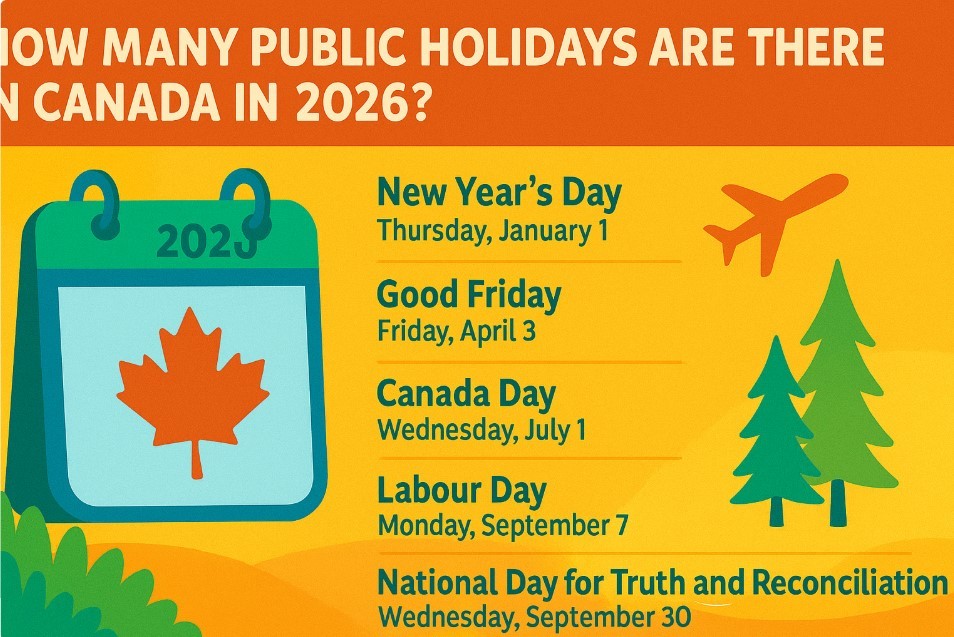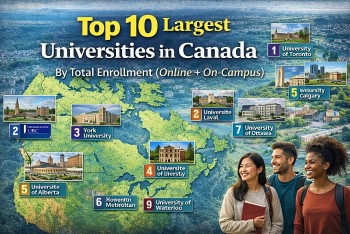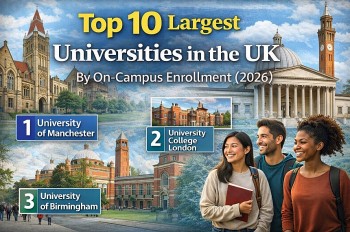2025 Turkey Calendar - List of Public Holidays, Religious Days: Significance, Celebration, and Activities
Overview of Holidays in Turkey
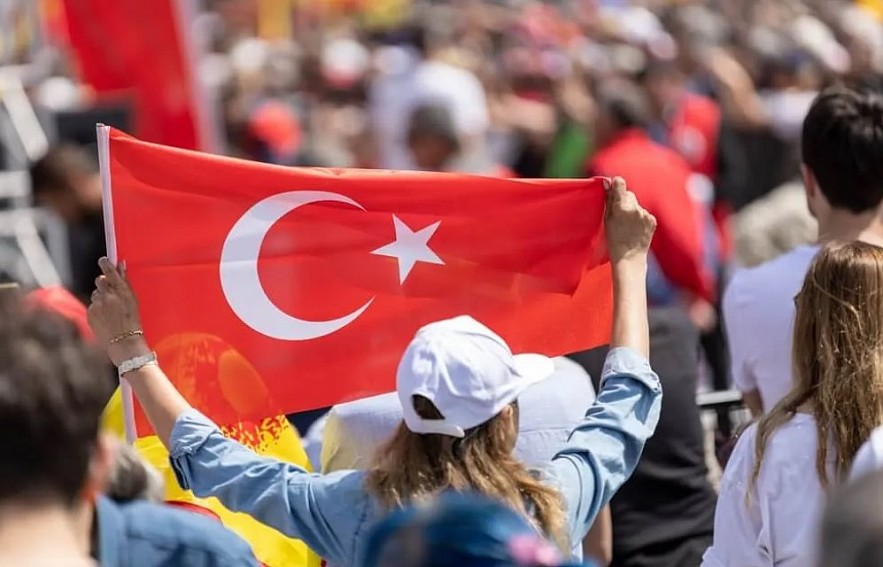 |
| Holidays in Turkey |
Holidays in Turkey constitute an integral aspect of cultural identity. Turkey categorizes official holidays into two types: religious holidays and public holidays, akin to many nations worldwide.
A national holiday in Turkey is rooted in the nation's history and culture. Moreover, the Turkish Republic (1923) establishes the majority of public (national) holidays, whereas the Islamic faith celebrates religious holidays. Irrespective of their classification as religious or public holidays, there will be some form of national celebration and observance. Consequently, banks, offices, and businesses may be closed, resulting in increased traffic congestion.
Learn more: Is Turkey In Europe Or Asia: A Transcontinental Country
Holiday Hours of Operation
Museums, archeological sites, and most other attractions drawing foreign visitors maintain their regular hours even on national civil (i.e., non-religious) holidays when government and business offices close.
The sole exception are the two main Islamic holidays, Ramazan Bayramı and Kurban Bayramı. Museums close for morning on first day of these holidays; second day they reopen after lunch and business as usual. Call the museum to find out before you schedule anything since the kind of museum you visit may determine this.
Public Holidays in Turkey
Offices, banks, and the majority of companies in Turkey will be closed on public holidays because they are official holidays. Additionally, a half-day holiday is sometimes required in Turkey in the days leading up to holidays.
• January 1st, New Year's Day: Turks celebrate New Year's on January 1, but most people will party and enjoy the day before because there are so many events and parties at night. Also, companies and cities will start decorating a month early.
• April 23rd, National Sovereignty and Children's Day: Atatürk gave children worldwide a gift on this day, which is how Children's Day got its name. Children organize poetry and activities honoring the importance of National Sovereignty and Children's Day a week in advance, and streets and schools are decked out. Although government offices, banks, and other establishments might close, life as a whole is not significantly affected.
• May 1st, Labor and Solidarity Day:Due to today's official holiday, most federal buildings and some private establishments will be closed. There isn't much to see, but it's important to be aware that workers might protest. Therefore, it is recommended to avoid popular areas and those near government buildings.
• May 19th, Commemoration of Atatürk, Youth, and Sports Day:To celebrate the youth of Turkey's national liberation movement, which began with Atatürk's 1919 landing in Samsun, the country honors its anniversaries. Celebrations and athletic competitions will be held all over the country, culminating in memorial services at Anıtkabir, the mausoleum of Mustafa Kemal Atatürk. If you get the chance, you should definitely attend a Turkish festival.
• July 15th, Democracy and National Unity Day: A new national holiday in Turkey honors the country's resilience in the face of a democratic coup attempt in 2016. Activities are scheduled to be held at Ankara's Kızılay National Will Square and Istanbul's July 15th Martyrs Bridge on July 15th. To avoid traffic, determine a route that avoids these areas.
• August 30th, Victory Day: The Turkish Independence War came to a close in 1922 with the decisive combat at Dumlupınar, which is commemorated on Victory Day. The Anıtkabir is the major venue for Victory Day celebrations and events.
• Republic Day falls on October 28th–29th, commemorating the day Mustafa Kemal Atatürk established Turkey as a republic, displacing the Ottoman Empire's constitution and assuming the role of the country's first president. On October 28, the day before Republic Day, there is a half-day break for everyone.
Learn more: Turkey National Anthem: English Translation, Original Lyrics And History
Islamic Religious Holidays in Turkey
The two most important religious holidays in Turkey are Kurban Bayramı, also called the Sacrifice Feast, and Ramazan Bayramı, also called Ramadan, which falls on the last day of the holy month of Ramadan. Since these two holidays are observed according to the traditional Islamic Hijri lunar calendar, their dates in the Common Era calendar vary each year.
• Ramadan Feast: In Islam, Ramazan Bayramı, also called Şeker Bayramı, is the most important religious holiday. It occurs three days after Ramadan, the blessed month of fasting and feasting for Muslims. Most businesses and government offices are closed for three days and the half-day prior to the holiday.
• Kurban Bayramı (Sacrifice Feast): The Islamic Sacrifice Feast honors Ibrahim's devotion to God. Families consume and give away animal sacrifices. The majority of people return home during Turkey's four-and-a-half-day official holiday, leaving cities empty. Steer clear of buses, trains, and flights because they are crowded and costly. When people return home on the first day of the Sacrifice Holiday, the majority of traffic accidents happen.
Full List of Public Holidays, Religious Days And Observances in Turkey for 2025
1 Jan Wednesday New Year's Day, National holiday
As part of the festivities that begin on New Year's Eve and culminate with the midnight hour on January 1st, Turkey observes New Year's Day as a national holiday.
For some, New Year's Day signifies a chance for a fresh beginning and the setting of resolutions, while for others, it represents a return to routine following a lively celebration with loved ones.
Turkey did not adopt the Western calendar until 1926, and it wasn't until 1935 that January 1st was declared a public holiday. Turkish culture boasts a wealth of enduring New Year's traditions.
The celebrations for the Turkish New Year and New Year's Eve resemble the traditions associated with Western Christmas. Lights, ornaments, "New Year's trees," and indeed, Santa Claus will be in attendance. Nonetheless, the celebrations also feature the illumination of fireworks.
On New Year's Eve, it is customary to present a lottery ticket for the Milli Piyango drawing, which is broadcast just before midnight. A vast multitude of individuals buy tickets, and the whole globe observes to witness the result.
1 Mar Saturday Ramadan Start (Tentative Date) Observance
The ninth month in the Islamic calendar is called Ramadan, sometimes referred to as Ramadhan or Ramzan. People of the Muslim faith around the globe devote this period to prayer, fasting, acts of charity, and religious practices. The final third of Ramadan holds particular significance as it commemorates the moment when the Prophet Muhammad received the initial revelations of the Koran.
Despite being a working day, Saturday, March 1, 2025, is when Ramadan begins. In Turkey, the majority of companies function within standard business hours.
20 Mar Thursday March Equinox Season
29 Mar Saturday, Ramadan Feast Eve/Ramazan Bayramı, Half Day
On the eve of Ramadan, a lot of Turkish people prepare traditional Ramadan desserts and change out their wardrobes. It's also a time to honor and remember the deceased.
Despite being a working day, Saturday, March 29, 2025, is Ramadan Feast Eve. In Turkey, most companies operate during regular business hours.
30 Mar Sunday, Ramadan Feast, National holiday
 |
| Families get together during the Ramadan Feast in nations like Turkey to participate in activities like sharing special meals. |
Turkish Eid al-Fitr, “Ramazan Bayrami,” begins at sunset on Ramadan's last day. The holiday is called “Sheker Bayrami” (Sugar Festival) because of all the candy and sweets eaten after fasting.
Ramazan Bayramı is a three-day public holiday. On the first of Shawwal, people in other countries attend Eid prayers, wear new clothes, give children small gifts, visit friends and relatives, send Eid greeting cards, and have large family feasts.
People call Eid al-Fitr the “Festival of Breaking the Fast.” Islam's five pillars include fasting from dawn to sunset during Ramadan ("Sawm"). Muslims believe Muhammad received the Qur'an in Ramadan.
Eid Al-Fitr Muslims say "Salat Al Eid". The Eid call to prayer is quiet. Muslims say two "Rakat" prayers in mosques or outdoors. After prayers, the imam preaches forgiveness, mercy, and peace.
Traditions include wearing new clothes, eating a date, and saying takbeer on the way to mosque.
Eid also involves giving money to the poor ('Zakat al-Fitr', depending on possessions), sending Eid greetings, and feasting with family.
Many Muslims celebrate Eid al-Fitr to thank Allah for his strength and guidance during Ramadan to practice self-control.
Today, Muslims say "Eid Mubarak," meaning "blessed festival."To wish the greeter well, say "Khair Mubarak" after Eid.
After defeating the Quraish in Jang-e-Badar in 624 CE, Muhammad and his companions celebrated the first Eid al-Fitr.
Bairam—Turkish for holiday—refers to Eid al-Fitr. Eid al-Adha, the holier Islamic festival, is called lesser because it is the 'Greater Bairam'.
Government, schools, post offices, banks, and some supermarkets close for three days during Ramadan Bayrami.
Turkish transportation on Ramazan's first and last days is chaotic as people head home or to hotels/beaches.
Istanbul holidays offer free public transportation. Public buses, trains, metrobuses, trams, funiculars, and ferries are covered.
31 Mar Monday Ramadan Feast Holiday (Tentative Date) National holiday
1 Apr Tuesday Ramadan Feast Holiday (Tentative Date) National holiday
23 Apr Wednesday, 23 Nisan/National Sovereignty and Children's Day, National holiday
 |
| National Sovereignty and Children's Day |
National Sovereignty and Children's Day (Ulusal Egemenlik ve Çocuk Bayramı) is a national holiday in Turkey, celebrated annually on April 23rd. "23 Nisan" commemorates the 1920 opening of the Grand National Assembly of Turkey in Ankara.
Throughout Turkey, students celebrate Children's Day and National Sovereignty with a week of singing and dancing on sports fields. The week ends with a big performance in Istanbul's national soccer stadium. Toys and candy are common presents for children from their parents.
An unusual way to celebrate, children are kings and queens of Türkiye for the day. The practice of having children sit in for adults in the Grand National Assembly was instituted by Ataturk in 1933. The purpose of this special session was to address issues pertaining to children and to sign executive orders pertaining to education and the environment. Education is provided to children from low-income households and orphanages.
Since the day was recognized by UNICEF in 1979, there has been a push for internationalization. To honor their heritage and participate in the Grand National Assembly for Children, numerous nations send delegations of young people. Young people hold ceremonies the size of stadiums to honor cultural diversity. Young people can work together in science while also sharing songs, poems, and traditional dances.
Schools and government offices are closed on public holidays. Public transportation routes may be altered due to street performances, so prepare for heavy traffic.
1 May Thursday Labor and Solidarity Day, National holiday
Many countries celebrate Labour Day on 1 May, including Turkey. Workers' contributions to the economy and society and the need for fair and safe working conditions are honored on this holiday.
Labor and trade union protests are common in Turkey on 1 May. Police will remove protesters from government-designated areas. Transit buses may change routes to avoid protests.
Political and labor protest agnostics can relax at home. Family picnics are possible. TV will air special speeches and events.
Labour Day became a public holiday in Turkey in 1923. After two years of violent protests in Turkey, the holiday was banned in 1925. Spring and Flowers Day returned 1935. The 1976 Taksim Square Labour Day protests were bloody and banned. The holiday was banned again in 1981. It returned as “Labour and Solidarity Day” in 2009.
19 May Monday, Commemoration of Atatürk, Youth and Sports Day, National holiday
Turkey celebrates Atatürk'ü Anma, Gençlik ve spor Bayramı, a national holiday that is observed every year on May 19th and is also known as Youth and Sports Day and Commemoration of Atatürk.
At this festival, we commemorate the landing of Mustafa Kemal at the Black Sea city of Samsun on May 19, 1919, marking the start of the Turkish War of Independence.
The whole country celebrates Youth and Sports Day with a plethora of sporting events, which draw huge crowds every year. During these national festivities, Mustafa Kemal Ataturk, the leader of the country's independence movement, is also feted.
Young Turkish athletes will begin their marathon run from the Black Sea port of Samsun around ten days before May 19th. That city was the birthplace of Ataturk's independence movement. As it is carried to Ankara, the capital city of Turkey, on May 19, the Turkish president will receive it.
Participation in smaller marathons and other public sporting events is open to people of all backgrounds.
Some observe May 19 as if it were the birthday of Ataturk, despite the fact that no one knows for sure when he was born. Wreaths are laid at Ataturk monuments and flags are flown from building to building.
6 Jun to 9 Jun, Kurban Bayramı/Feast of Sacrifice, National Holidays
 |
| Foods for Kurban Bayramı in Turkey |
In Turkey, the holiday known as Eid al-Adha is frequently referred to as "Kurban Bayrami." Another name for it is the "feast of sacrifice."
The Muslim holiday known as Kurban Bayrami commemorates the moment when Ibrahim was ordered by Allah to sacrifice his son Ishmael, as recorded in the Koran. Ibrahim allegedly attempted to do so but was abruptly stopped by Allah. Muslims applaud Ibrahim's readiness to submit to Allah under such trying circumstances.
In Turkey, men from every family customarily attend a special morning prayer at the mosque on the first day of the Sacrifice Feast. The sacrificed goat is decorated with ribbons and henna in some regions of the country. Instead of offering animal sacrifices, some Turkish people have begun to donate to charitable organizations in recent years.
During the Sacrifice Feast, people typically dress to impress. During the holiday, they host visitors in their homes or pay visits to friends and family. As a sign of respect, young people kiss the hands of their elderly neighbors and relatives when they greet them. In Turkey, some people even take vacations during the holidays.
The roads are congested on the first and last days of Kurban Bayram as everyone either makes their way to their family's house or hides out at a hotel or beach.
5 Jun Thursday Sacrifice Feast Eve (Tentative Date) Half Day
6 Jun Friday Sacrifice Feast (Tentative Date) National holiday
7 Jun Saturday Sacrifice Feast Holiday (Tentative Date) National holiday
8 Jun Sunday Sacrifice Feast Holiday (Tentative Date) National holiday
9 Jun Monday Sacrifice Feast Holiday (Tentative Date) National holiday
21 Jun Saturday June Solstice Season
15 Jul Tuesday, Democracy and National Unity Day, National holiday
Turkey observes Democracy and National Solidarity Day as a public holiday on July 15. It was only given that name last year, following a failed coup attempt on the same day by certain Turkish Armed Forces members.
A portion of the army rebelled and attempted to seize control of various cities, including parts of the capital city of Ankara. The uprising failed despite the fact that President Erdogan was on vacation at the time.
Within a day, the rebels began to surrender, with the majority of the army and all of the national police remaining with the government. To get rid of those believed to be aiding the rebels, there was a purge in the military, police, and civil services following the coup.
Shortly after the failed coup attempt to overthrow him, in December 2016, President Erdogan declared July 15th to be Democracy and National Solidarity Day, also called Democracy and Freedom Day.
Special memorial services for the soldiers, police officers, and others who assisted in putting down the coup but were killed in the process will be held on this day. Given that the majority of Turkish citizens appeared to support the ruling government, while some backed the rebels, it is evident that this is a contentious holiday.
30 Aug Saturday, Victory Day, National holiday
 |
| Ataturk commanding his troops at the Battle of Dumlupınar. Image by Mustafa Sururi Taylan |
Every year on August 30, Turkey observes Victory Day (Zafer Bayramı) as a national holiday. It may also be known as Armed Forces Day. Victory Day commemorates the outcome of the Battle of Dumlupınar, which determined the outcome of the Turkish War of Independence in 1922.
This day also honors Mustafa Kemal Atatürk, the man who established modern-day Turkey.
Both the northern part of Cyprus and all of Turkey celebrate Victory Day. It is a commemoration of the Turkish military and republic. The main celebrations are held in Ankara at the Mausoleum of Atatürk.
On this day, marches are held in the country's biggest cities, and all military promotions are awarded during a ceremony at the War Academy in Istanbul.
Hundreds of servicemen march in formation with military vehicles in a massive military procession that takes place on Vatan Avenue in Istanbul.
Banks, council offices and the Turkish stock exchange will be closed on Victory Day.
22 Sep Monday September Equinox Season
28 Oct Tuesday Republic Day Eve Half Day
29 Oct Wednesday Republic Day, National holiday
Cumhuriyet Bayramı, or Republic Day, is observed annually on October 29 in Turkey. Turkey's National Day is today. Additionally, October 28 in the afternoon is a holiday.
The celebration commemorates the Turkish republic's declaration on October 29, 1923.
The holiday lasts for thirty-five hours, starting at 1:00 pm on October 28. The republic's founding is honored with parades, torchlight processions, and musical performances.
In the country's capital, Ankara, visitors can visit Atatürk's mausoleum or pay respects at the many statues of the leader dotted around the country. Additionally, people gather to celebrate in stadiums and on public streets, and they typically participate in evening parades.
Like other national holidays, Saturdays are usually when public transportation in Turkey runs. Most businesses, banks, council offices, schools, and the Turkish stock exchange will all be closed.
On Republic Day, public transportation in Istanbul is free.
10 Nov Monday Ataturk Commemoration Day, Observance
Ataturk Commemoration Day is not a public holiday. It falls on Sunday, 10 November 2024 and most businesses follow regular Sunday opening hours in Turkey.
21 Dec Sunday December Solstice Season
31 Dec Wednesday New Year's Eve Observance
In Turkey, New Year's Eve is one of the most celebrated holidays. In this nation, New Year's Eve customs include a countdown to midnight, a national lottery drawing, and a family meal. The Gregorian calendar has December 31 as New Year's Eve.
There is no public holiday on New Year's Eve. Companies open for business during regular hours.
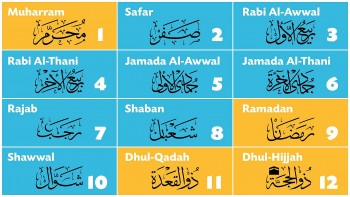 Islamic Calendar in 2025: Important Dates, Holidays, Observances and Celebrations Islamic Calendar in 2025: Important Dates, Holidays, Observances and Celebrations Let's examine the complete schedule of Islamic festivals, popular events, and religious days for 2025. |
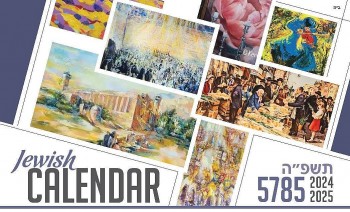 Jewish Calendar in 2025: Important Dates, Holidays, Observances and Celebrations Jewish Calendar in 2025: Important Dates, Holidays, Observances and Celebrations Take a look at the complete list of Jewish holidays that will be observed in 2025, as well as the most well-known festivals and celebrations. |
 Canada Calendar in October 2024 - Full List of National Holidays, Observations And Special Days Canada Calendar in October 2024 - Full List of National Holidays, Observations And Special Days Canadians celebrate a wide variety of holidays, special occasions, observations, and international events during the month of October, a celebration that mirrors the rich cultural ... |
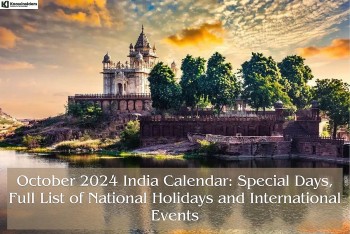 India Calendar in October 2024: Full List of National Holidays And Special Days India Calendar in October 2024: Full List of National Holidays And Special Days People from all walks of life will gather in October 2024 to respect and celebrate the country's rich traditions and heritage. Take a look at ... |
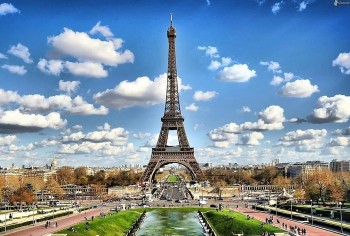 France Calendar in 2025 - Full List of Public Holidays And Observances: Dates and Celebrations France Calendar in 2025 - Full List of Public Holidays And Observances: Dates and Celebrations The abundance of French public holidays allows for plenty of downtime, festivity, and vacation time. Here you may find a list of all the French ... |

